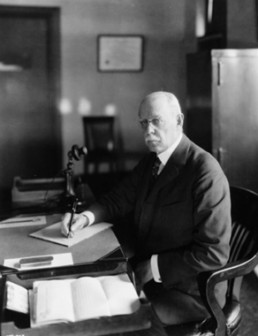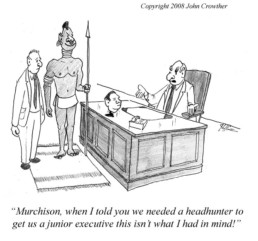The Candidate Pool – Active vs. Passive Candidates
The Candidate Pool – Active vs. Passive Candidates
by Peter Cotton, founder and president of Best Sales Talent, LLC

Recently, an HR director told me about a position that he was seeking to fill. Before committing to using my services, he said that he had “pushed the market” to find candidates on his own. Fair enough. I’d rather have him do that and exhaust his efforts prior to having me spending my time on a search, only to learn weeks into it that he had done his own recruiting parallel to mine and filled the position on his own. Since time is my most precious asset, I am never thrilled by wasting it.
In marketing, there are push and pull strategies. In a pull system, the consumer requests the product and 'pulls' it through the delivery channel. So, if a candidate is looking for a job, he or she might approach a company by submitting an unsolicited resume in the hopes of getting an employer interested. On the other hand, in a push marketing system, the sales efforts are initiated by the producer, and information is ‘pushed’ toward the buyer. In recruiting terms, this means that the employer is pushing information onto the market about the job, i.e. advertising or posting the job on websites or networking to get referrals. That’s fine, so long as you don’t care about letting your competitors know that you have a weakness (an open territory that they could penetrate), or letting your customers know that they have no sales rep to deal with for awhile. But, getting respondents from job postings or referrals means one thing: the employer is not seeing the “entire pool” of candidates. They are only looking in the “shallow end” of the pool.
There are only three kinds of candidates:
Unemployed Lookers (a.k.a. Active Candidates):
These candidates are out of work and are looking for a job full time (or at least they should be) and it is highly unlikely that an employer will find a superstar candidate (competitor) with industry-specific sales experience among them. These candidates frequently will apply for jobs that they are not qualified for, shot gunning their resume around to any and all employers. They work with multiple employment agents, too. Many times a referral falls into this category. An employer’s worker, or a contact, refers a friend, neighbor, or relative who is out of work and needs a job. They are trying to help the person, but typically the person has none of the qualifications for the position which is open. Employers should ask themselves: “If this is a really good sales person, why is he out of work?”
Employed Lookers (as in the above category a.k.a. Active Candidates):
These people are employed, but they are actively seeking a new job, since they are unhappy with the one they have for some reason. Sometimes these candidates are perennially unhappy. Everywhere they work, they are unhappy with something – the boss isn’t good, the pay isn’t good, the co-workers aren’t good, the benefits aren’t good, etc. So these employed lookers regularly read and respond to many job postings, they work with more than one recruiter at a time, and their focus is not on a specific job, but many possible jobs. These candidates do get hired at times, but employers should ask themselves: “Can I make this person happy, or will he continue to look even after he comes on board, since his resume is posted and circulated, and he may continue to get solicited by other employers and recruiters scouring the job board databases once we hire him?”
Employed Non-Lookers (a.k.a Passive Candidates):
These people are not actively looking for a job since they are happy, thought well of, highly productive, one of the best, if not the best at their job, could be working for a competitor, or a similar kind of company. They are not looking at job postings and don’t have an up-to-date resume. Just because a job is advertised, doesn’t mean they are going to get excited about it – especially since they are not actively reading job postings in the first place. Top talent expects to be wooed by a recruiter or competitor. They need to be “romanced,” motivated, and sold on a particular opportunity. They become the buyer. The employer is the seller. When employers approach an employed non-looker, if they launch into selling the job to the candidate prematurely, without doing the necessary wooing of the person first, the candidate will most likely tell the employer he is not interested. “Hunting” for a top performing, employed non-looker is a lot like trying to catch the only big fish in a pond. Just as you wouldn’t speed onto the scene in a noisy motorboat, you cannot “barge” onto the scene trying to sell the job at the beginning of the conversation, unless you have gotten into the candidate’s head first to find out his real motivations, career aspirations, likes and dislikes, as well as his desires. Employers and HR people usually are not trained in conducting that kind of exploratory conversation. However, it’s what recruiters do every day.
Therefore, the “candidate pool” is comprised of these three types of candidates: unemployed lookers, employed lookers, and employed non-lookers. Employers are fooling themselves if they think that they are hiring the best candidates by only talking to the candidates of the first two classifications, since they make up only a small part of the workforce.
Unemployed and Employed Lookers make up 20 percent of the workforce, while employed non-lookers make up 80 percent of the workforce.
There is a big difference in quality, experience, and past performance between the best talent in-the-market and the best talent on-the-market. Candidates ON the market are 20 percent of the workforce. They are the active candidates and tend to be found in the “shallow end” of the pool. Candidates IN the market are the other 80 percent of the workforce, and they are NOT looking. They are the passive candidates, and they are only found in the “deep end” of the pool. The “deep end” is where recruiters spend their time. When employers don’t use recruiters, they are hiring the best talent only from the people actively looking for a job (on the market).
I’ve never heard an employer extol the virtues of all the great people to be found on the big job boards like Monster, Career Builder, etc. telling me that’s where he finds most of his new hires. When I ask employers: “Is YOUR resume on Monster?” or “Would you put YOUR resume on Monster?” nine out of 10 respond “NO,” thereby classifying these employers as Employed Non-Lookers (“deep end” of the pool). Top performers don’t post their resumes on job boards. They know that their current employer could find them there – and that makes for some very uncomfortable conversations. It can lead to jeopardizing the top performer’s career.

Recruiters like me spend time in the “deep end” of the pool finding and attracting superstars. I have yet to meet a professional salesperson who is not interested in doing better. We will call and woo a superstar into a conversation about himself – asking about his real motivations, career aspirations, likes and dislikes, as well as his desires – demonstrating we are truly interested in him, and desirous of being his personal career enhancer. Then we will ask if he would consider looking at a new opportunity if it was clearly better than what he now has. Only then will he talk with us and only then would he consider speaking to one of our clients – even if it is a competitor of his. These are the “big fish.” The kinds of candidates recruiters will find, because recruiters are not afraid of swimming in the “deep end” of the pool.
10 Qualities of Exceptional Interviewers
10 Qualities of Exceptional Interviewers
by Jeff Haden
Ghostwriter, Speaker, Inc. Magazine Columnist

Everyone agrees no business is better than its employees. So if hiring the right people is so important... why are most interviewers satisfied with being mediocre interviewers?
Maybe they assume the burden of greatness lies solely with the employee. (“Hey, it’s his job to impress me.”) But that's short-sighted and, well, stupid.
To find the best employees you possibly can, you must be the best interviewer you possibly can.
Here are the key qualities of skilled interviewers:
1. They understand their real needs.
A great employee doesn't just fill a slot on the org chart. A great employee solves at least one critical business need.
So while credentials, qualifications, and experience are important, never forget you’re not hiring a position: You’re hiring a result. You don’t need a Sales Director; you need someone who will sell. You don’t need a VP of Ops; you need someone who can produce on time.
Identify your real business need… determine what successfully meeting that need looks like, because that defines the skills and attributes you’re looking for… think about cultural fit… and tailor the interview (and everything else in your hiring process) to finding the perfect person to solve your critical business need.
Otherwise you’re just wasting your time.
2. They ensure candidates can come prepared.
All candidates should know exactly what to expect: When, where, who will be conducting the interview(s)... they should know everything. Great interviewers ensure candidates don’t have to deal with surprises, tricks, or uncertainty.
For example, take the surprise group interview. A group interview can be intimidating for the candidate, especially when it's unexpected. If the position requires working predominately within a team group interviews can provide a feel for the candidate's suitability. In that case, tell candidates ahead of time so they can prepare. Otherwise hold individual sessions.
But no matter what, let the candidate know who will be conducting the interview(s.)
And never forget that a new employee’s first day isn’t their first official day; their first day is the day they first engage in your hiring process because that's when their experience with your company really starts.
Make the experience awesome from the start.
3. They do more research on the candidate than the candidate does on the company.
Every interview guide tells candidates it’s important to research the company. So isn’t it just as important for the interviewer to research the candidate?
Of course, especially since you can’t ask intelligent questions and foster a compelling conversation unless you really know the candidate.
Start with the resume. Focus not just on jobs and qualifications but also on what the resume indicates about the candidate’s interests and goals.
For example, look at her first job: What did she accomplish? What projects did she work on? When did she change roles? When did she get promoted? What do changes in responsibilities and duties indicate about her performance?
Then move to the next job: Why did she leave her previous job? What does that say about her career path? What does that say about her interests? Your goal is to read between the lines to get a sense of the candidate’s successes, failures, and long-term interests.
Then do a quick survey of social media. What are her interests? What does she like to do outside of work? What can that indicate about how she will fit in your company’s culture? And whom does she network with? What does that say about her broader goals and professional interests?
The key is to know as much as you possibly can ahead of time, both for reasons of “due diligence” and because…
4. They make the interview a conversation, not an examination.
The best interviews are a great conversation, not an interrogation. But you can't have a great conversation with someone you hardly know.
The more you know about the candidate ahead of time, the more you can ask questions that give the candidate room for introspection and self-analysis.
5. They bring shy or nervous candidates out of their shells.
Some otherwise great candidates just don’t interview well. They're shy or nervous and don't make a great first impression.
But an awkward interview doesn’t mean a candidate can't excel at the job: While some positions do require the ability to instantly establish rapport (like sales), in many others a lack of conversational skills in no way signals a lack of expertise.
It’s easy to help a nervous candidate relax – especially if you’ve done your homework. Compliment a few of his accomplishments. Ask a question about a hobby or outside interest. Ask a few softball questions you know he can hit out of the park. Take a few minutes to help him gain confidence and settle in.
Average interviewers feel it’s the candidate’s responsibility to be “on.” Skilled interviewers feel it’s their responsibility to get the best from every candidate – even those who at first might seem totally out of their depth.
6. They wisely go off script.
An interviewer should follow a plan and ask a reasonably specific set of questions, but the best questions are almost always follow-up questions. Follow-up questions take you past the canned responses and into the details, both positive and negative.
Listen to the initial answer, pause, and ask how. Or why. Or when. Or who actually did what. Or what made a success difficult to achieve. Or what was learned from a failure. Or what made a job hard or a project difficult. Or what made a task fun. Or what the candidate would do differently, and why.
When something sparks your interest, talk about it. Ask questions. Who knows where the conversation will go.
Not only will you get past the canned responses, you’ll also learn details—positive and negative—the candidate never planned or would have thought to share. The real superstars show up in the details, and it’s a skilled interviewer’s job to get those details.
And occasionally you’ll find a candidate who may not be right for this one… but might be perfect for a different opening.
7. They never take over.
Interviews often turn into monologues delivered, unfortunately, by the interviewer.
Most candidates won’t interrupt or try to restore balance to the interview; after all, they want you to like them. Unfortunately that means your hiring decision is largely based on whether the candidate was a good listener.
You learn nothing about the candidate when you’re the one talking. That’s why skilled interviewers make the conversation 90% candidate, 10% interviewer – or even less.
8. They thoroughly describe the next steps.
Few things are worse than being a candidate who has no idea what, when, or if something happens next.
Don't make the candidate ask about the next steps. Explain the rest of the process. Explain what you will do, and when you plan to do it.
And then actually do it.
9. They never fall into the “checklist trap.”
Conduct enough interviews and it’s natural to start ticking off mental boxes during the interview.
“Let’s see,” you think. “Experience: good. Qualifications: good. Skills: good. Attitude: good. Work ethic: good. Cultural fit: good…”
Everything is “good”… which unfortunately means that without realizing it you can easily start to think a candidate with no negatives is an awesome candidate.
Skilled interviewers are unreasonably selective about the people they hire. They don’t want to hire the candidate whose qualifications and interview fails to raise any issues or concerns. They want to hire the candidate who will excel in meeting their real business need.
An absence of negatives is never a superlative. Demand excellence. Look for superlatives. Skilled interviewers never get lazy and settle for average. Don’t settle for good enough – because good enough rarely is.
10. They provide closure to every candidate.
Failing to follow up is rude and unprofessional. Think about it: Candidates paid your business a massive compliment by wanting to work with you. (Why is that a massive compliment? They’re willing to spend more time with you than they do with their family.)
Plus, when you don’t provide closure, candidates won't complain to you… but they will complain about you.
Describe next steps, follow through on those steps, contact candidates when the process for some reason gets delayed, and eventually provide closure to every candidate – period.
Not only is that good business, it’s the right thing to do.
Brown's Job
Brown's Job
A tip of the hat to Paul Hawkinson, who years ago published this story in The Fordyce Letter. This article was written by Mr. F. R. Feland, and first appeared in the house magazine of Batten, Baron, Durstine & Osborne (ad agency BBDO). It has been reprinted many times in different publications. Please excuse the archaically sexist language, but remember, this was written in 1920, nearly 100 years ago.
--------------------------------------------------------------------------------------------------------------------------
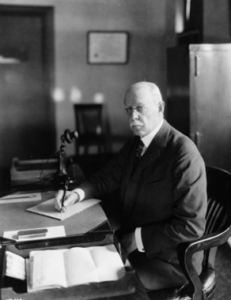
“Brown is gone and many men in the trade are wondering who is going to get Brown’s job. There has been considerable speculation about this. Brown’s job was reputed to be a good job. Brown’s former employers, wise, gray-eyed men, have had to sit still and repress amazement as they listened to bright, ambitious young men and dignified old ones seriously apply for Brown’s job.
Brown had a big chair and a wide, flat-topped desk covered with a sheet of glass. Under the glass was a map of the United States. Brown had a salary of thirty thousand dollars a year. And twice a year Brown made a ‘trip to the coast’ and called on every one of the firm’s distributors.
He never to tried to sell anything. Brown wasn’t exactly in the sales department. He visited with the distributors, called on a few dealers, once in a while made a little talk to a bunch of salesmen. Back at the office he answered most of the important complaints, although Brown’s job wasn’t to handle complaints. Brown wasn’t in the credit department either, but vital questions of credit usually got to Brown, somehow or other, and Brown would smoke and talk and tell a joke, and untwist his telephone cord and tell the credit manager what to do.
Whenever Mr. Wythe, the impulsive little president, working like a beaver, would pick up a bunch of papers and peer into a particularly troublesome and messy subject, he had a way of saying, ‘What does Brown say? What does Brown say? What the hell does Brown say? – Well, why don’t you do it, then?’ And that was disposed.
Or when there was a difficulty that required quick action and lots of it, together with tact and lots of that, Mr. Wythe would say, ‘Brown, you handle that.’
And then one day the directors meet unofficially and decided to fire the superintendant of No.2 Mill. Brown didn’t hear of this until the day after the letter had gone.
‘What do you think of it, Brown?’ asked Mr. Wythe.
Brown said, ‘That’s all right. The letter won’t be delivered until tomorrow morning, and I’ll get him on the wire and have him start East tonight. Then I’ll have his stenographer send the letter back here and I’ll destroy it before he sees it.’
The others agreed, ‘That’s the thing to do.’
Brown knew the business he was in. He knew the men he worked with. He had a whole lot of sense, which he apparently used without consciously summoning his judgment to his assistance. He seemed to think good sense.
Brown is gone, and men are now applying for Brown’s job. Others are asking who is going to get Brown’s job – bright, ambitious young men, dignified older men.
Men who are not the son of Brown’s mother, nor the husband of Brown's wife, nor the product of Brown’s childhood – men who never suffered Brown’s sorrows, nor felt his joys, men who will never love the things that Brown loved nor fear the things he feared – are asking for Brown’s job.
Don’t they know that Brown’s chair and his desk, with the map under the glass top, and his pay envelope are not Brown’s job? Don’t they know that they might as well apply to the Methodist Church for John Wesley’s job?
Brown’s former employers know it. Brown’s job is where Brown is.”
The Old Man, The Boy and The Donkey
The Old Man, The Boy and The Donkey

The boy rode on the donkey and the old man walked. As they went along, they passed some people who remarked it was a shame the old man was walking and the boy was riding. The man and the boy thought maybe the critics were right, so they changed positions.
Later, they passed some people that remarked, “What a shame, he makes the little boy walk.” The man and the boy then decided they would both walk.
Soon they passed some more people who thought they were stupid to walk when they had a decent donkey to ride. So, they both rode the donkey.
Now they passed some people that shamed them by saying how awful it was to put such a load on a poor donkey. The boy and the man said they were probably right, so they decided to carry the donkey.
As they crossed a bridge, they lost their grip on the animal and the donkey fell into the river below and drowned.
The moral of this story: If you try to please everyone, you might as well kiss your ass goodbye.
Sometimes Too Much Education Is Not A Good Thing
The Man Who Sold Hot Dogs
 There was a man who lived by the side of the road and he sold hot dogs. He was hard of hearing so he had no radio. He had trouble with his eyes, so he read no newspapers. But he sold good hot dogs.
There was a man who lived by the side of the road and he sold hot dogs. He was hard of hearing so he had no radio. He had trouble with his eyes, so he read no newspapers. But he sold good hot dogs.
He put up signs on the highway telling passersby how good they were. He stood by the side of the road and cried, “Buy a hot dog, Mister?” And people bought.
He increased his meat and bun orders. He bought a bigger stove to take care of his trade. Business was booming. He finally got his son home from college to help him out. He just got a good education. But then, something happened.
His son said, “Father, haven’t you been listening to the radio? Haven’t you been reading the newspapers? There is a big depression. The European situation is terrible. The domestic situation is worse.”
Whereupon the father thought, “Well, my son has been to college, he reads the papers and he listens to the radio, and he ought to know.”
So the father cut down on his meat and bun orders, took down his advertising signs, and no longer bothered to stand out on the side of the highway asking people if they wanted to buy a hot dog. And his hot dog business fell almost overnight.
“You’re right, my son,” the father said to the boy. “We certainly are in the middle of a great depression.”
What Recruiters Wish Hiring Managers & Candidates Knew About Recruiting
What Recruiters Wish Hiring Managers & Candidates Knew About Recruiting
From time to time, a guest writer will appear in this blog. This post is by Allan Erickson, President of Talentmatch. It resonates for me. He has put into words what I have felt for nearly 4 decades in the recruiting business. Thank you, Allan, for graciously allowing us to post it.
---------------------------------------------------------------------------------------------------------------------------------------------------------------
Recruiting is a lot like playing solitaire: everything must be perfectly lined up, the slightest hitch means the game is over, and you lose more often than win.
I work virtually, and alone. My only connection to the outside world is via email and telephone. Rarely do I see a candidate or hiring manager face to face. Consequently, I have to operate like a blind man, using all senses except sight, smell, taste and touch. That leaves me with hearing. Oh, I use sight to read emails of course, but that too is mostly a matter of hearing. I work alone, but not in a vacuum. At best what we as recruiters do is act as matchmakers, encouraging a little romance where there's mutual interest, and increasing the probability of a good marriage.
Communication is key: frequent and clear communication is optimal.
My profession can be especially challenging for other reasons: most everyone at one time or another is suspicious of recruiters. This is understandable. We are fringe factors, integral but not integrated, influential but not altogether accountable. Trust is therefore crucial.
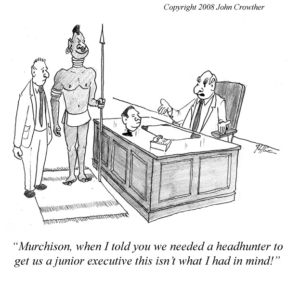
"Headhunter" traditionally refers to a person in the jungle who stalks human beings, kills them, and boils 'em up for dinner. This places recruiters pretty much at the level of cannibals, a few pegs lower than lawyers, politicians, used car salesmen, garbage collectors and process servers. When people say, "Oh, you're a headhunter," I try to explain that I truly work to elevate my activities away from predation, toward the agrarian, preferring the negotiating table to the chopping block. Only consistent performance over time will persuade a skeptic that you are not a cannibal.
I try to thoroughly understand what the client wants, what the candidate wants, and work to find good matches to accomplish win-win outcomes. It's all matters of trust. And with any human endeavor, based largely on human behavior, the outcomes are sometimes lose-lose.
I've had candidates accept offers and bail out at the last minute, taking a job elsewhere, leaving me looking poorly in the eyes of the client for an outcome I had no control over. I've had managers hire candidates and refuse to pay my fee. I've had managers accuse me of trying to simultaneously recruit for and against them, something I don't do and consider unethical and inappropriate. Still there's the fear and suspicion at times. I've had candidates go in and totally blow an interview by dressing or behaving inappropriately. Client phone calls pointing this out, though rare, are nonetheless embarrassing. Unfortunately I have also had the sad experience of hiring managers who believe the best way to conduct an interview is to verbally assault candidates. Needless to say, once I discover this is happening, I don't send any more candidates into the lion's den.
Interestingly I've never had a candidate come back and get in my face about helping them find a job. After thousands and thousands of interviews and hundreds of placements, this is a source of great satisfaction. My ultimate payoff is when the candidate and client alike are glad to be working together, achieving mutual success.
I certainly don't want to leave the impression that hiring managers are the problem. The vast majority are interested in building their organizations through the legitimate use of a recruiter and sound hiring practices. The vast minority are problem children.
But even the best hiring managers miss a cue here and there. If you trust your recruiter, take his or her word (backed with documentation of course) that the candidate being presented is worthy of serious consideration. What most hiring managers don't realize is that the recruiter has likely been through hundreds, if not thousands of resumes, has sent innumerable emails, and conducted countless canvassing calls to find one or two qualified/interested/available candidates. If you don't trust your recruiter, why are you working with him?
Essentially recruiters are called upon to be all things to all people, which is, insane!
- career counselor for candidates
- hiring consultant for managers
- negotiating agent for candidates
- advocate for clients
- occasional HR consultant for client companies
- job description consultant/writer
- compensation consultant
- appointment setter
- appointment canceler
- diplomat both ways
- private investigator both ways
- a sounding board, a whipping post, a shoulder to cry on
(I think I should be paid much more!)
My focus has been the realization that I'm dealing with peoples' livelihoods, an awesome responsibility.
In part, the candidates I present for employment consideration, and the hiring managers I serve, rely on me to give them good advice, and that advice can greatly enhance their ability to earn a living, or it can hurt them substantially if poorly compiled and lent.
Consequently, I do my level best to communicate accurately and openly, acting as a conduit so that eventually, candidates and managers can do the deep discovery and make good decisions themselves, all the while realizing that much of the process and its outcome are a matter of perception. I don't know everything the hiring manager knows and so I don't second-guess hiring decisions.
My job is to understand, and then seek to be understood. I encourage clients and candidates alike: trust me, communicate with me and great things may happen, but nothing good comes from fear and suspicion, so if my ceiling is your floor, don't walk all over me, just show me the door, or better yet, coach me some more!
The Very Serious Effects of Lowering Your Price
The Very Serious Effects of Lowering Your Price

XEROX TRAINS THEIR SALES REPRESENTATIVES
ON THE IMPORTANCE OF HOLDING FIRM ON THEIR PRICING STRUCTURE
A common problem with new, inexperienced sales people (and even tenured ones at times) is that they succumb to the pressures of the customer to lower their price, yet they are expected to deliver the same products at the same level of service. There isn’t a manager in the world who hasn’t seen a sales rep “cave” on price when they are in “Panic-Selling Mode” (badly needs a sale to make quota or to keep his or her job). But few sales reps, and sadly, even fewer managers, know what dropping the price really means to the company’s profitability.
Dropping prices to satisfy a customer only requires additional unit sales from somewhere else at higher levels of profitability in order to compensate (stay even) when sales representatives “Panic-Sell.”
Most Americans are poor with their math skills and some customers would have the salesman believe that dropping prices from 30% to 20% is only a 10% reduction. In reality it is a 33.3% reduction. There are very few manufacturers who would stay in business very long if they made it a habit of dropping their prices by 33.3% just because their customers told them to do so in order to get their business.
Every business person is aware of the incredible success story of the Xerox Corporation and their excellent training programs for their sales people (Xerox Professional Selling Skills). Their sales training programs are unparalleled and have been replicated by countless companies around the world. They teach their sales representatives from the outset that deep discounting undermines the profitability of the company, and that it can lead to disaster, including lay-offs of employees and cutbacks in benefits.
Like most good companies, Xerox bases their sales commission plan on gross profits, not on gross sales. They show their sales reps the chart below to demonstrate the serious dangers of dropping their prices. Although it was meant for the Xerox sales force, this chart is very applicable to any sales person selling any products or service. Virtually any company or any sales person could benefit from understanding what price and profitability really means to their organization
YOU MUST SELL MORE TO BREAK EVEN
To find the percentage of increase in unit sales you must make in order to earn the same gross profit for the company when you cut a price, follow the table from left to right and look in the column headed GROSS PROFIT IS. See the examples at the bottom of the table.
If You Cut
Your
Price |--------------AND YOUR PRESENT GROSS PROFIT IS------------------------------|
|
5% |
10% |
15% |
20% |
25% |
30% |
35% |
40% |
|
|
1% |
25.0% |
11.1% |
7.1% |
5.3% |
4.2% |
3.4% |
2.9% |
2.6% |
|
2% |
66.6% |
25.0% |
15.4% |
11.1% |
8.7% |
7.1% |
6.1% |
5.3% |
|
3% |
150.0% |
42.8% |
25.0% |
17.6% |
13.6% |
11.1% |
9.4% |
8.1% |
|
4% |
400.0% |
66.6% |
36.4% |
25.0% |
19.0% |
15.4% |
12.9% |
11.1% |
|
5% |
100.0% |
50.0% |
33.3% |
25.0% |
20.0% |
16.7% |
14.3% |
|
|
6% |
150.0% |
66.7% |
42.9% |
31.6% |
25.0% |
20.7% |
17.6% |
|
|
7% |
233.3% |
87.5% |
53.8% |
38.9% |
30.4% |
25.0% |
21.2% |
|
|
8% |
400.0% |
114.3% |
66.7% |
47.1% |
36.4% |
29.6% |
25.0% |
|
|
9% |
1000.0% |
150.0% |
81.8% |
56.3% |
42.9% |
34.6% |
29.0% |
|
|
10% |
200.0% |
100.0% |
66.7% |
50.0% |
40.0% |
33.3% |
||
|
11% |
275.0% |
122.2% |
78.6% |
57.9% |
45.8% |
37.9% |
||
|
12% |
400.0% |
150.0% |
92.3% |
66.7% |
52.2% |
42.9% |
||
|
13% |
650.0% |
185.7% |
108.3% |
76.5% |
59.1% |
48.1% |
||
|
14% |
1400.0% |
233.3% |
127.3% |
87.5% |
66.7% |
53.8% |
||
|
15% |
300.0% |
150.0% |
100.0% |
75.0% |
60.0% |
|||
|
16% |
400.0% |
177.8% |
114.3% |
84.2% |
66.7% |
|||
|
17% |
566.7% |
212.5% |
130.8% |
94.4% |
73.9% |
|||
|
18% |
900.0% |
257.1% |
150.0% |
105.9% |
81.8% |
|||
|
19% |
1900.0% |
316.7% |
172.7% |
118.8% |
90.5% |
|||
|
20% |
400.0% |
200.0% |
133.3% |
100.0% |
||||
|
21% |
525.0% |
233.3% |
150.0% |
110.5% |
||||
|
22% |
733.3% |
275.0% |
169.2% |
122.2% |
||||
|
23% |
1115.0% |
328.6% |
191.7% |
135.3% |
||||
|
24% |
2400.0% |
400.0% |
218.2% |
150.9% |
||||
|
25% |
500.0% |
250.0% |
166.7% |
Example 1: If you cut your price by just 9% with a usual profit margin of only 10%, you must increase your unit sales by 1,000% to break even. In other words, if you ordinarily sell two units a month at the regular price with a 10% profit margin, and then decide to cut your price by 9%, you will have to sell 20 more units just to break even on profitability for your company!
Example 2: If you cut your price by 24% with a usual profit margin of 25%, you must increase your unit sales by 2,400% to break even. In other words, if you ordinarily sell two units a month at regular price with a 25% profit margin, and then decide to cut your price by 24%, you will have to sell 48 more units just to break even on profitability for your company!
STILL THINK IT’S A GOOD IDEA TO CUT YOUR PRICE? THINK AGAIN!
Poor Hiring Practices Spells Negative PR For Companies
Poor Hiring Practices Spells Negative PR For Companies
or
How The Law of 250 Can Adversely Affect Your Brand
by Peter Cotton, founder and president of Best Sales Talent, LLC

I talk to plenty of job-seeking candidates every week. Like a doctor taking a patient’s history before recommending any treatment, I always ask the candidate what they have done so far about making a career change. That’s when I hear about the interviews they have had so far. During these conversations, I frequently learn about some of the really bad treatment the hiring managers have given them.
Let me be clear about the ramifications of treating candidates poorly.
Have you ever heard about the Law of 250?
Simply stated, if I gave a person an unlimited budget to host a lavish party and told him or her to invite as many people as they wished, he or she would have no problem coming up with a guest list of 250 people. It would be comprised of family, including distant relatives, friends, neighbors, co-workers, etc. If every one of these guests were duly impressed with the décor, service, food, ambiance and music, thereby having a great time at the party, they’d be sure to tell many others about what a marvelous time they had, how gracious the host was to them, how lovely it was, etc.
The reverse is also true.
If the party was held outdoors on a blistering summer day (temperatures in the high 90’s with humidity over 80%), no shade, nowhere to sit down, only one bartender, cold food presented in an unattractive way which was covered with flies, no music, no décor or ambiance, what do you suppose the “reviews” would be when they spoke to people about it once the party was over?
Candidates can be customers – their entire extended family, their friends, their neighbors and their co-workers can all be customers of a company doing the interviewing. This is even more important if the interviewing company makes or sells consumer products. Now, with today’s technology, when candidates get turned off from a poorly conducted interview or have received bad treatment, they not only spread the word among the 250 who they know, but they “inform” hundreds of thousands of others they don’t know via Facebook and Twitter. They text and email their story and these stories get forwarded. They post it on their own blogs. And to make things even worse for the interviewing company, disgruntled candidates post their stories to sites like:
www.ripoffreport.com/reports/search/interviews
There are scores of others.
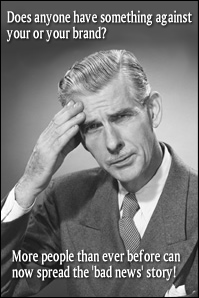
Treating candidates with respect, as important people, is the key. Employers should be welcoming candidates in every way possible. From giving specific directions on how to get to their offices, on where to park, an offer to use the restroom on their arrival, the gesture of providing coffee or a cold drink, a tour, introduction to others, a genuine interest in them and respect for their time. You get the idea.
Fortunately for us, when employers work with recruiters, we rarely hear negative stories like what you will see in the list below. These usually happen to candidates who have gone directly to the employer by responding to a job posting.
Here now, in no particular order, are some of the things we hear that candidates have experienced and that certainly are negatively impacting on the reputations of companies and their brands:
-- Candidate is given a date and time for a phone interview, but the employer is not available at the appointed time. Call goes to voicemail. Call is not returned by the employer the same day, but is the next day --usually at an inconvenient time for the candidate (when he is at work surrounded by co-workers and cannot speak). Sometimes the employer never returns the call at all.
-- Candidate drives a great distance for the interview, taking a full day out of work, using up a vacation day. The employer forgets about the interview and isn’t there.
-- No feedback/communication from employer after an interview – leaving the candidate totally in the dark for weeks on end.
-- HR promising a prompt decision, but no decision comes -- for weeks and even months. One candidate lamented that she waited more than 6 months after her first and only face-to-face interview, only to learn that they hired from within.
-- Many candidates report being treated disrespectfully – as if they were an interruption to the employer’s day, not important or valued – even candidates who are eminently qualified for the job.
-- Employer invites candidate into the office for an interview, but the candidate is kept waiting in the lobby for over an hour while the employer makes phone calls from his office.
-- Employer takes several phone calls (totaling 15 minutes) during the candidate’s 30-minute interview.
-- Employer allows co-workers and subordinates to enter the room during the interview for conversations pertaining to day-to-day business.
-- Stress interviews – candidate is forced to look across the desk towards the employer who is seated in front of a window. The sun is pouring in over the shoulder of the employer onto the candidate’s face. Employer is in shadow.
-- Other stress interview tactics: verbally assaulting candidates, asking irrelevant questions (how many birds can fit in a tractor trailer) then acting as if the candidate is stupid for not having a quick answer; asking questions in rapid sequence, interrupting the candidate and hardly giving them a moment to answer; asking the candidate their opinions on politics, religion and sex.
-- Employer calls an employed candidate at 7 PM on a Monday evening asking the candidate to come in for an interview at 8 AM the next day.
-- Not reimbursing a candidate for mileage when the candidate drove 200 miles round trip to come for the interview as requested.
-- Candidates waiting months to get reimbursed for air, rental car, hotel and meal expenses incurred on an interview.
-- Subjecting a candidate to 6 interviews with different people over several weeks, then giving the candidate a test, only to learn that he “doesn’t fit the profile.”
-- HR strings a candidate along for 6 months with constant promises that another interview is forthcoming, if only the hiring manager’s schedule permitted it, “since he works so hard, travels so much, and has so much to do.” After several months, the candidate is so frustrated and disgusted, they would never dream of working for such an indecisive company (As the romance goes, so goes the marriage.)
-- Employers who continuously interview, bringing in more and more people, but never eliminating people they saw months earlier. Those interviewed first wait endlessly for an answer about a next step.
-- Candidate takes several days out of work, counts them as personal days/vacation days, goes through several rounds of interviews only to learn the company decided to fill the position internally.
These are only a few examples.
Smart employers protect their company reputation and brand by treating candidates they interview as VIPs. They spend considerable time training their employees to understand that candidates can destroy the company reputation from having just one bad encounter. That can ultimately cost the company BIG money. Very BIG money from lost customers and from other qualified candidates learning that the company is one NOT to work for.
Don't Assign RESUME.DOC as the File Name
Don't Assign RESUME.DOC as the File Name
by Peter Cotton, founder and president of Best Sales Talent, LLC

Yesterday I received no less than seven unsolicited emails from candidates looking for a new career. Every one of their resumes had the file name of RESUME.DOC Although I touched on this subject in an earlier blog post ( http://tinyurl.com/la7sfbk ), I'd like to expand on the subject.
Calling Your Resume: RESUME.DOC
We have received thousands of resumes over the last 40+ years called RESUME.DOC. So have countless other recruiters and employers.
Sure, you know it is YOUR resume on YOUR computer at home, but once it gets to us with that file name, we have to take the time to change it -- otherwise we won’t be able to find it as easily on OUR computer. Imagine the problem if all candidates submitted their resumes as RESUME.DOC !
Worse: Any recruiter or employer (or their administrative assistants) might mistakenly save your file as RESUME.DOC and over-write the one with the same name they got five minutes earlier. Oops…it happens to yours, too… the next time they get the same filename of RESUME.DOC in their inbox five minutes from now from another person!
The best file name for your resume is: Resume of John Doe.DOC, especially if you ARE John Doe – otherwise, use your own name J.
For your own benefit, don’t make it Resume of John Doe January 1 2011.DOC because when you use it in August of 2013 to find a job, an employer or recruiter might think it is taking you a very long time (32 months) to find a new job, so what is wrong with you? Any date on your resume goes out of date fast. Even one that is only 30 days old.
Some other tips -- Don‘t make your file name as:
- Resume of John Doe Customer Service Version.doc
- Resume of John Doe Version 8.doc
- Resume of John Doe for ABC Company.doc
- Resume of Top Sales Pro.doc
Here is why:
1. Resume of John Doe Customer Service Version.doc If you make different versions, one for customer service, one for sales, one for management, and one for social work, inevitably you will send the wrong one to either the recruiter or employer, i.e. you are applying for a sales position and you mistakenly send them the file Resume of John Doe Social Work version.doc Not good. You’ll be eliminated right away.
2. Resume of John Doe Version 8.doc Showing you have different versions also sends the wrong signals. Either you are showing you are indecisive, or that you have many different versions meaning that you are applying for many different kinds of jobs. Employers who want to fill a sales management job, for instance, want a candidate who is totally focused on the same kind of work, not on 8 or more different jobs. Analogy: You ask a girl to the prom, and then you ask 7 others. Do you think any of the girls feel special that you want to go out with her, and her alone
3. Resume of John Doe for ABC Company.doc Adding the name of the company you are applying to in the filename of your resume is not wise, since there is a strong chance you will send it to another company but forget to change the name. So when XYZ, Inc. gets your resume intended for the ABC Company, you can bet they will question your real motivation to work for them. This also applies to cover letters. We get many cover letters as separate files (accompanying resumes) which are emailed to us only to find that the person (and company) the cover letter is addressed to is not us.
4. Resume of Top Sales Pro.doc This ought to be obvious, but sometimes ego gets in the way of logic. Stating you are a Top Sales Pro is extremely subjective on your part. Let your record speak for itself and allow the employer or recruiter to determine your level of skill. Don’t present yourself in a negative connotation revealing an inflated view of yourself, your talent, and your importance.
Keep It Simple is the best advice I can give candidates. Your resume should be called: RESUME OF (YOUR NAME).DOC
Why Recruiters Are Worth What They Charge
Why Recruiters Are Worth What They Charge

by Paul Hawkinson (Former Editor of The Fordyce Letter)
“When I need a heart by-pass, rest assured that I won’t select my surgeon on the basis of what he charges.”
That’s what an ailing executive recently opined when he was informed by his doctor about his arterial blockage problems.
Why then are corporate executives so tightfisted when dealing with what is so commonly thought of as the “heartbeat” of their companies . . . top-talent?
Companies think very little about paying the often excessive fees charged by their outside accounting and legal firms . . . or even to the gaggle of consultants who promise cost-cutting and streamlining miracles in other areas of operations.
Yet, when faced with brain drains, talent deficiencies or the need to replace one employee with a better one, their thoughts too often turn to parsimony. This K-mart mentality belies and contradicts their stated objectives to “hire the best,” especially at pecking order levels below the “big picture” executive suite inhabitants.
Of course recruiting fees can vary from firm to firm but, when they do, you will almost always find that those on the low side are sure to exclude some very key ingredients of the process, all of which are vital to providing the indispensable services necessary to satisfy the needs of the employer.
So why are recruiters worth what they charge? Just a few of the often unspoken reasons are:
Expertise – Nobody knows the employment marketplace better than a professional recruiter . . . nobody! In-house human resourcers, no matter how effective, view the marketplace through an imperfect or misrepresentative prism and tunnel vision is their occupational hazard.
Just as physicians are cautioned against treating members of their own families, so too is it folly for an in-house H/R professional to believe that they have an undistorted and unbiased picture of the employment landscape. They are vulnerable to the pressures of internal politics and cultural dimensions which do not hinder the outsider.
Street-smart recruiters already know the neighborhood, including the unlisted addresses so often overlooked by the insiders.
Cast a wider net – A professional fisherman will always have more to show than a weekend angler. Recruiters are in the marketplace day in and day out. They know the unfinished coves, reefs and inlets that are unknown to others. The job-hunter bookshelves are filled with lore about the “hidden job market.” The same holds true for professional recruiters who have a detailed road map to the hidden talent sources which will never be accessed by newspaper ads, alumni associations, applicant databases, job boards or any of the other more familiar sources of people.
There are occasional pearls through these sources (and someone inevitably wins the Publisher’s Clearinghouse Sweepstakes too) but you have to shuck an awful lot of smelly oysters to find them. Recruiters only give you oysters proven to contain pearls. Your only job is to determine which pearl is the best.
Want to catch what you’re fishing for? Hire a guide!
Cost – There is a misconception among employers that the cost of a hire equals the cost of the ads or Internet postings run to attract the person hired. Nothing could be further from reality.
Try adding these to the true cost and you’ll see just how cost effective an outside recruiter can be:
Salaries and benefits of the employment/recruiting staffs plus those of the line managers involved in the hiring activity (who are not productive in their normal job pursuits when they’re out recruiting); travel, lodging and entertainment expenses of in-house recruiters; source development costs; overhead expenses including but not limited to telephone, office space, postage, PR literature, applicant database maintenance, reference checking, clerical costs to correspond with the hundreds of unqualified respondents, etc.
Unbiased third party input – Contrary to what some believe, recruiters don’t try to put square pegs into round holes. A recruiter’s stock-in-trade is their integrity and their reputation for finding someone better than a company could have found for themselves.
For a mid to senior-level executive, the average recruiter may develop a “long list” of a hundred or more possibilities. Each must be called and evaluated against the position specifications as well as the personality “fit” with the company and the people with whom they will ultimately work. Once this is winnowed down to the “short list,” an even more intensive interviewing process begins to narrow the search to a panel of finalists for review by the client.
This process is not, as some believe, simply romping through the file cabinets, harvesting from the Monster lookalikes or putting the job opening out to others on the recruiter’s network with crossed fingers that someone good will show up.
It is highly unlikely that a professional recruiter will be plowing new ground with your opening. They deal within spheres of influence far more familiar with your needs than any internal recruiter and, more often than not, view the finalists as people who are competent to solve client problems rather than just fill an open slot in the organizational chart.
Because they want to do business with you again and again, they are looking for (and challenging you to excellence by hiring) the “truly exceptional” rather than the “just satisfactory” so often settled for by in-house hirers.
Confidentiality – Advertising or otherwise publicly proclaiming an opening, aside from its cost and demonstrated ineffectiveness for sensitive senior level openings, often creates anxiety and apprehension among the advertiser’s current employees who wonder why they aren’t being considered or worry about newcomer transition problems. Just as often it alerts competitors to a current weakness or void within the company.
Speed – The recruiting process is always faster through a search professional who is continually tapped into the talent marketplace than one having to start the process from scratch. For every day that a key opening remains unfilled, a company’s other employees must grudgingly do double duty. And this doesn’t factor in the profit opportunities or competitive advantages lost to a company because a position remains unfilled or is done on a part-time basis by others less qualified.
Post-Hire Downtime – Not only is speed an essential part of the professional recruiter’s process, the ability to locate a person who can immediately “hit the ground running” with a minimum of “ramp-up time” saves time after the hire. All too often, a hire selected through less effective sources offering a smaller talent pool requires several months of expensive training and orientation.
Reality – Professional recruiters often recognize and have a duty to inform clients that they may be mistaken as to the type of person sought, the salary required to attract them or the possibilities that the solution might just lie in areas outside the traditional target industries . . . something an internal recruiter is politically disinclined to do. Too many hirers fail to understand that a professional recruiter’s primary function is not necessary to fill a slot but to provide the right candidate to solve a problem.
Negotiation – Master negotiator Herb Cohen says that, “negotiation is the analysis of information, time and power to affect behavior . . . the meeting of needs (yours and others’) to make things happen the way you want them to.” As a buffer and informed intermediary, the professional recruiter is better able to blend the needs and wants of both parties to arrive at a mutually beneficial arrangement without the polarizing roadblocks which too frequently materialize in face-to-face dealings.
Prioritizing company resources – It is often amazing to see how much of a company’s revenues are squandered on non-productive perks for existing high-level employees while they penny-pinch on what is every company’s lifeblood . . . talent acquisition.
Club memberships and the like may be fine, but no one with an IQ higher than Forrest Gump’s believes that these expenditures substantially contribute to a company’s profit margin. But one well-placed employee can be the cause of a company’s profits skyrocketing. And the fee for having hired these people pales to insignificance when compared to the contributions they make to the bottom line.
The next time you think a recruiter’s fees are too high, put them in the proper perspective before asking for that Blue Light special or spinning your wheels thrashing about trying to fill vital openings with less effective (but not necessarily less expensive) pedestrian methods. Savvy executives learned long ago that the fee paid to a recruiter is a shrewd strategic investment, not an extraneous expense. They also know that the “best” is far different from the “best available.”


